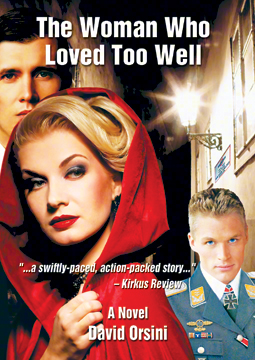The Woman Who Loved Too Well
A Novel by David Orsini
Reviewed by Lois Cuddy
Author of T. S. Eliot and the Poetics of Evolution
The reader who loves novels with complex characters, with plots weaving together unrelieved mystery and tension, and with the richest language to accomplish this highest of literary achievements must read THE WOMAN WHO LOVED TOO WELL by David Orsini. From the first scene to the final agonizing moment, the reader is connected to Simone and Marc (and Gerhard) as they try to survive the dangers of Europe during WWII as well as the perils of obsession and loyalty. Trapped in a world and a war that they did not create and struggling to nurture a love that will transcend reality and internal conflict, these brave, intelligent, admirable, and flawed characters are extraordinary in their determination to defeat the Nazis and, if they are lucky, to survive with their love and their souls intact. Even the Nazi pilot, Gerhard, demands our admiration not only for his magnificent physicality and capacity to love and trust, but also for his ethical and personal conflicts over his country’s shame.
I did not anticipate the novel’s ending. Like the rest of the plot, it was a shock and yet the elements of storytelling fit perfectly. This author has done a masterful job with the characters—their motives, perceptions, memories, and passions--and with a plot that might have seemed improbable but that is made perfectly plausible and even inevitable. I was kept in suspense throughout the novel.
The remarkable language, with its rhetorical flourishes and descriptive capacity to capture a range of experiences, keeps us on an emotional tightrope between the terrors of war, both external and internal, and the wonders of nature that survives amid the destruction all around us. From the appreciation of the landscape to the wonders of passion, this author describes both the best and the worst of human nature as he presents a lovely and disturbing exploration of endurance, motivation, desire, loyalty, generosity, courage, and cruelty.
THE WOMAN WHO LOVED TOO WELL shows such under- standing of the human heart, of passion, guilt, love, obsession, and suffering, that it is well worth reading—then reading again
TITLE INFORMATION
The Woman Who Loved Too Well
A Novel by David Orsini
Quaternity Books (331 pages)
KIRKUS BOOK REVIEW
In this romantic drama set against the backdrop of World War II, a young woman and loyal member of the French Resistance seduces a Nazi in order to negotiate the freedom of a captive friend—though she finds herself falling for the enemy. Simone and Marc Roussillon are a young married couple whose devotion to each other is rivaled only by their devotion to the Allied war effort. Simone serves as a spy, while Marc is renowned for his bravery as a pilot. When their friend Jean-Claude Jourdan is captured by the Nazis, they decide to do whatever it takes to get him back— including sending Simone straight into the arms of Gerhard Hauptmann, a German officer sent to court Simone's nuclear chemist father for the Nazi cause. Simone has her husband's blessing to trick the German into thinking she loves him in order to convince him to barter for Jean-Claude's freedom. However, no one anticipated that Simone would fall in love with the dashing Gerhard, who is less a monstrous Nazi than a loyal German conflicted by the Third Reich's crimes. The passionate romantic entanglement brings the violence of the battlefield home to them all. Orsini ("Bitterness/Seven Stories," 2013,etc.) pens a swiftly paced,
action-packed story…. His knack for creating high levels of psychosexual drama, jealousy and tension, as well as a number of well-placed plot twists, will likely keep readers engaged right down to the explosive conclusion.
A violently emotional and occasionally over-the-top story of love and war.
Erin Sullivan's Review of David Orsini's Novel
The Woman Who Loved Too Well
David Orsini's novel The Woman Who Loved Too Well is an honest portrayal of the effects of war, jealousy, and betrayal. As I began reading the novel, Bob Dylan's famous war ballad "With God on Our Side" repeatedly came to mind. Like the ballad, Orsini's novel forces the reader to reconsider creeds such as loyalty, self-sacrifice, and honor. The three main characters, Marc, Simone, and Gerhard, are trapped by their circumstances, as well as by their hearts. They are torn between their sense of duty to their nation and their ability to pursue private happiness. Simone is at the center of this precarious love triangle. Marc places Simone in a compromising position in order to secure the safe return of their dearest friend and ally, Jean-Claude. Simone loves and admires her husband, and yet she is drawn to Gerhard, an enemy because he is a Nazi. Simone tries to keep her feelings at bay. But, as her understanding of Gerhard deepens and as she comes to know the man that he really is, she can no longer suppress her desires. To break from her passions would be to cut off her lifeline.
Any story should be about some change, large or small. In this novel, Marc, Simone, and Gerhard all change in astonishingly different ways, ways that are both surprising and blindsiding. It is remarkable how Orsini is able to transform his characters into flesh and blood. The author uses sensory imagery and rich descriptions to take the reader on a journey beyond the page. I was transported to 1942 in Switzerland by the pictures Orsini creates of life swirling around his conflicted characters. The reader will relish not only the authentic scenery, but also the lively adventures and the dangerous conflicts.
The Woman Who Loved Too Well is an extraordinary novel. The author has succeeded in constructing a historical literary thriller with artful mastery. David Orsini's words will stay with the reader long after the final awe-inspiring scene.
Erin Sullivan teaches English literature and composition at The Sylvan Learning Center in Rhode Island.
|



